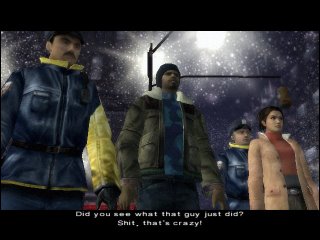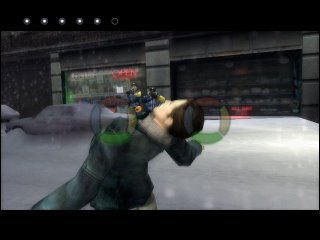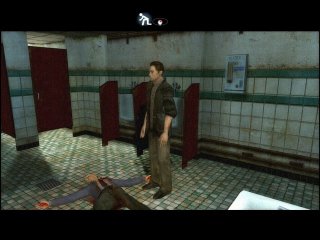Quick Review: Indigo Prophecy aka Fahrenheit

Website: http://www.atari.com/indigo/I read enough online at forums about "Indigo Prophecy" (USA, but known as "Fahrenheit" overseas - as the USA version has some trivial nude scenes cut out) and decided to finally look into the game, and downloaded the demo. While the demo was insultingly short - I found the gameplay to be very refreshing in these days of 5-star first-person-shooter releases. "Indigo Prophecy" (IP) is an adventure-action game. It is not as tedious as say, Myst where you are stuck in one viewpoint had need to click and point around to find clues. IP plays out like a movie - your viewpoint is very much like what you would see in a movie - with different camera angles, cinematic post-production effects on the visuals (such as color fading, motion blur, and other effects in some scenes or realtime gameplay). You can control the camera view depending on the scene - sometimes you can swing it around the character, pop into first-person mode (only to look, can't walk in this mode), or in other scenes a tap of the right-mouse-button changes the rigged camera angle.
Screenshots/Demo: http://www.3dgamers.com/games/fahrenheit/
Platform: X-Box, PS2, PC CD-ROM
As you start the game, you find you are in control of Lucas Kane, and your goal is to unravel the reason behind a rather nasty thing you just did - murdered a diner patron in the restroom, while in some sort of possession or trance. Because of this, Lucas feels he is not quite resposnible for his actions and thus decides to evade the police while on his quest to find out how this all happened. We learn later on that very similar murders are being committed around the city, and have in the past - but not by Lucas. So, generally you are unravelling a supernatural conspiracy which as the title indicates, involves a prophecy of sorts.

Soon in the game you'll also control 3 other characters - Carla and Tyler, detectives of the New York police department, and Markus - Lucas' priest brother whom he has lost ties with. Your control of these characters helps you to understand the story from multiple viewpoints, just as you would witness in a movie. Depending on your character and scene, you will be talking with other people, searching areas for needed items or clues, or going through action sequences. The dialogue with other people is often a timed choice of dialogue - by moving the mouse in the direction of the icon next to a particular option, you will perform that action or speak/inquire that dialogue. For instance, moving the mouse up while holding the left-button may open a door, while pulling it down might have your character kneel down and look at a clue or speak with someone. Some sequences require left-right arrow key mashing to simulate your character's strenght such as when holding on to something, or walking against a tough wind. This can get very frustrating, sometimes downright impossible - but usually completable. (In fact I have found lowering your in-game resolution for some reason, has an effect on key feedback delay, and thus I was able to pass a few of these frustrating bits.)
The action sequences are performed by doing a "Simon Says" type of mini-game. By hitting keys (or using a gamepad) in correspondence with 8 lights (4 on the left and 4 on the right, each have up, left, right and down), and doing it in a timely manner - your character will perform an action to pass through that particular moment of the scene. These Simon Says sequences usually appear in sets, and really aren't too hard as the lights don't flash too quickly. But you will still need to pay attention.
Characters and general environment design are all done well. Faces tend to have emotion displayed depending on the mood, mouths move with dialogue (even if the lip-syncing isn't perfect, it's OK enough). Speaking of moods, also in the game your character's mental health is something you will need to occasionally take care of. It never becomes tedious, but it's something to not forget. Your mental state ranges from wrecked, overwrought, depressed, stressed, tense and neutral. Once you're at wrecked, it's game over. At this point your character may have chosen a game-ending decision - maybe it's leaving the NYPD force, or deciding not to live. You maintain your mental health by doing things that will content or cheer up your character, such as drinking a glass of water, warming your hands over a fire, speaking with somebody - generally little things like this.
The blessing of IP is this: multiple choices throughout the game. Depending on what you do, and what you say - your character and the people around you are affected, whether now - or later in the game. Leave evidence behind and the cop wanting to check your apartment will see it, question you and it may be game over. Hide it and you may be cool. It's not always that straightforward, though. You just need to explore a bit - but it is very satisfying because you can play scenes differently, to get different outcomes - making IP a rather replayable game - especially with 3 different endings. Scenes aren't always just focused on you however. Some scenes may split into 2 or more windows, almost like a comic-book panel - and in realtime show what is going on in other areas - such as you standing in the bathroom, and a cop walking down the hall about to enter the bathroom. It definitely is one way to elicit suspense and tension.

The music score is hauntingly done. Additionally the game features licensed music from the rock band "Theory of A Deadman" - of which you can choose tracks on your stereo system in your apartment to play, while you play the rest of the scene out. The atmosphere throughout the game is memorable as well. You will be inside and outside, in snowy weather and dark, eery halls. With 4 characters and over 40 chapters to play, the game should have enough variation to keep you on your toes. Some other quick things to note. The game auto-saves throughout chapters, by scenes. You can access where you left off, or click a chapter to replay it. The only bothersome thing here is you cannot skip any cutscenes. It would be welcome if you're replaying a chapter and don't want to watch them again.
Overall if you want a refreshing game that feels like an interactive movie, and has a decent amount of replayability and choice-affects-outcome gameplay, and you are comfortable with a paced progression (face it this isn't a run-n-gun game) - Indigo Prophecy/Fahrenheit is a great game. It felt a tad short, but nothing too bad. The story is a constantly intriguing, supernatural murder mystery that never really let me down or felt blatantly hollow - and best of all, it actually had enough depth to get me to feel a little empathy for some of the characters. I can't think of many games that do just what a good movie can do. Try out the demo, DO NOT let it discourage you by it's stupidly short length - if you like the gameplay you find in it (and give yourself a chance to adapt to it and understand it!), you won't go wrong with the full version.
Rating: 4 out of 5
Pros: Replayable, looks great, very cinematic/filmic feel, engaging and intriguing, mysterious storyline and character depth. Interesting gameplay formats. Doesn't require a workhorse PC (800 Mhz minimum)
Cons: Could've been maybe 5 chapters longer. The bug? of high-resolution affecting key feedback in the left-right key-mashing action sequences was very frustrating - shouldn't have to lower your resolution just to alleviate the issue.

1 Comments:
nice review Phait, keep it up :)
Post a Comment
<< Home